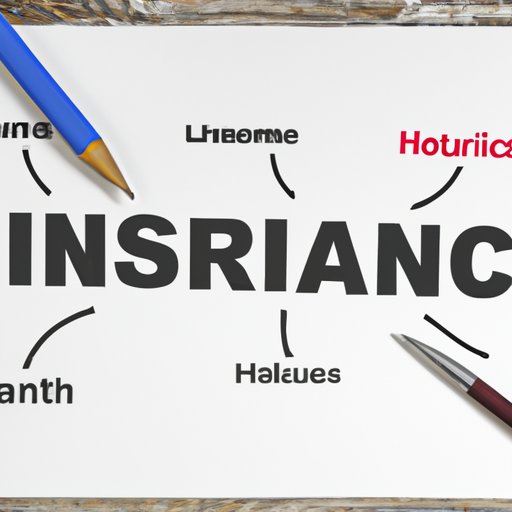Introduction
One of the most pressing concerns for many people today is finding affordable health insurance. With healthcare costs on the rise, it can be challenging to navigate the ins and outs of different plans and prices. This article aims to provide a comprehensive guide to understanding the costs of health insurance and how to find coverage that fits your budget.
The True Cost of Health Insurance: What You Need to Know
Health insurance is a type of insurance that covers the cost of medical expenses. It works by pooling risk among a large group of people, so that healthy individuals help to offset the costs of those who require medical treatment.
When you purchase health insurance, you’ll typically pay a monthly premium. This is the cost of your insurance policy and can vary depending on a number of factors, such as your age, location, and the type of plan you choose.
In addition to your premium, you’ll also be responsible for paying a deductible, copay, and coinsurance. Your deductible is the amount you’ll need to pay out of pocket before your insurance kicks in. Your copay is a fixed dollar amount you’ll pay for each medical service. Your coinsurance refers to the percentage of the cost of care that you’re responsible for paying yourself.

Why Health Insurance is Priceless: A Look at the Benefits of Coverage
The benefits of having health insurance are numerous. For one, having coverage can protect you financially in the event of an unexpected medical emergency. Without coverage, you may be responsible for paying thousands of dollars out of pocket for medical expenses.
But health insurance also has benefits for your overall health. With coverage, you’re more likely to seek out preventative care, such as regular checkups and screenings. This can lead to early detection of health issues and can help you avoid more serious health problems down the line.
On the flip side, not having health insurance can be detrimental to your financial and physical health. Without coverage, you’re more likely to delay or forgo necessary medical treatment, which can lead to more serious health issues and higher medical expenses in the long run.
Navigating the Ins and Outs of Health Insurance Costs
Understanding your health insurance plan can be a daunting task. But there are tips and tricks that can help make it more manageable. For example, it’s important to read through your policy carefully and ask questions to your insurance provider if you don’t understand something.
You’ll also want to be aware of any hidden fees or other expenses that may not be covered by your insurance. For example, many plans have a separate deductible for prescription drugs, which can add up if you require expensive medications.
Finally, it’s important to use your health insurance to your advantage. Make sure you’re taking advantage of preventative care, and don’t be afraid to shop around for medical services to find the best price.
Breaking Down the Numbers: How to Find Affordable Health Insurance
There are many different types of health insurance plans available, which can make it challenging to compare costs and benefits. Some common types of plans include HMOs, PPOs, and POS plans.
When evaluating plans, it’s important to consider both the monthly premium and the deductible, copay, and coinsurance. You’ll also want to compare benefits, such as coverage for prescription drugs and preventative care.
To find coverage that fits your budget, you may want to consider shopping around and comparing different plans. You can also look into government programs, such as Medicaid or Medicare, if you qualify.
The Pros and Cons of Different Health Insurance Costs
There are pros and cons to all types of health insurance plans. For example, HMOs tend to have lower monthly premiums, but often require you to choose a primary care physician and may have more restrictions on which medical providers you can see.
PPOs, on the other hand, may have higher monthly premiums but offer more flexibility in choosing medical providers. Ultimately, the best type of plan for you will depend on your individual needs and budget.
Is Health Insurance Worth the Expense? Understanding the Value
While health insurance can be expensive, it’s important to remember that it can pay off in the long run. According to a study by the Kaiser Family Foundation, people with health insurance save an average of 30% on medical expenses compared to those without coverage.
When weighing the costs and benefits of having health insurance, it’s important to consider both the financial and physical benefits. Having coverage can help protect you financially in the event of an unexpected medical emergency, and can also lead to better overall health outcomes.
How to Save Money on Health Insurance Without Sacrificing Quality Coverage
If you’re concerned about the cost of health insurance, there are steps you can take to save money without sacrificing quality coverage. For example, you may be eligible for discounts or tax credits based on your income or other factors.
You can also consider raising your deductible to lower your monthly premium, or choosing a high-deductible plan that’s paired with a health savings account. This allows you to save money pre-tax to use towards medical expenses, which can help offset the cost of your deductible.
Conclusion
While health insurance may be expensive, it’s an important investment in your financial and physical health. By understanding the true cost of health insurance and the benefits of having coverage, you can make informed decisions about finding affordable and quality coverage that fits your needs and budget.
For more information on health insurance options, visit healthcare.gov or speak with a licensed insurance agent.
